Unit 9 Entrepreneurship: Ventures, Impact, and Entrepreneurs
VerifiedAdded on 2020/10/05
|15
|4581
|441
Report
AI Summary
This report delves into the multifaceted world of entrepreneurship, examining various venture types including small, medium, micro, large, scalable, and social businesses, highlighting their similarities and differences. It analyzes the impact of micro and small businesses on the economy, supported by statistical data, and discusses how these businesses contribute to the growth of the social economy, particularly in the context of 'Brexit'. The report also investigates the characteristics, traits, and skills of successful entrepreneurs, using Bill Gates and Steve Jobs as examples, and explores how background and experience can influence entrepreneurial success. It covers key aspects such as the roles of small businesses in the UK economy, challenges faced, and government support measures.

UNIT 9 Entrepreneurship
Paraphrase This Document
Need a fresh take? Get an instant paraphrase of this document with our AI Paraphraser
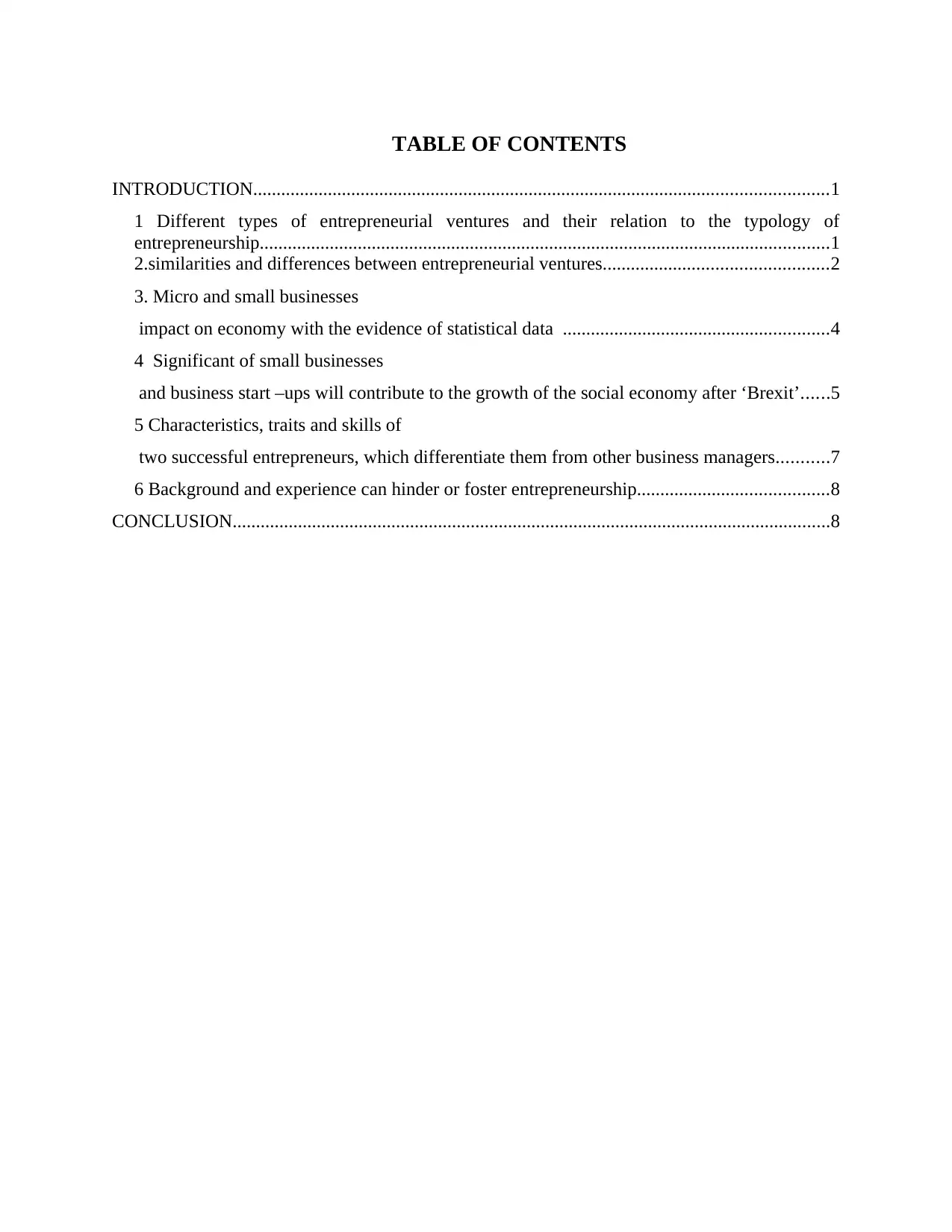
TABLE OF CONTENTS
INTRODUCTION...........................................................................................................................1
1 Different types of entrepreneurial ventures and their relation to the typology of
entrepreneurship..........................................................................................................................1
2.similarities and differences between entrepreneurial ventures................................................2
3. Micro and small businesses
impact on economy with the evidence of statistical data .........................................................4
4 Significant of small businesses
and business start –ups will contribute to the growth of the social economy after ‘Brexit’......5
5 Characteristics, traits and skills of
two successful entrepreneurs, which differentiate them from other business managers...........7
6 Background and experience can hinder or foster entrepreneurship.........................................8
CONCLUSION................................................................................................................................8
INTRODUCTION...........................................................................................................................1
1 Different types of entrepreneurial ventures and their relation to the typology of
entrepreneurship..........................................................................................................................1
2.similarities and differences between entrepreneurial ventures................................................2
3. Micro and small businesses
impact on economy with the evidence of statistical data .........................................................4
4 Significant of small businesses
and business start –ups will contribute to the growth of the social economy after ‘Brexit’......5
5 Characteristics, traits and skills of
two successful entrepreneurs, which differentiate them from other business managers...........7
6 Background and experience can hinder or foster entrepreneurship.........................................8
CONCLUSION................................................................................................................................8
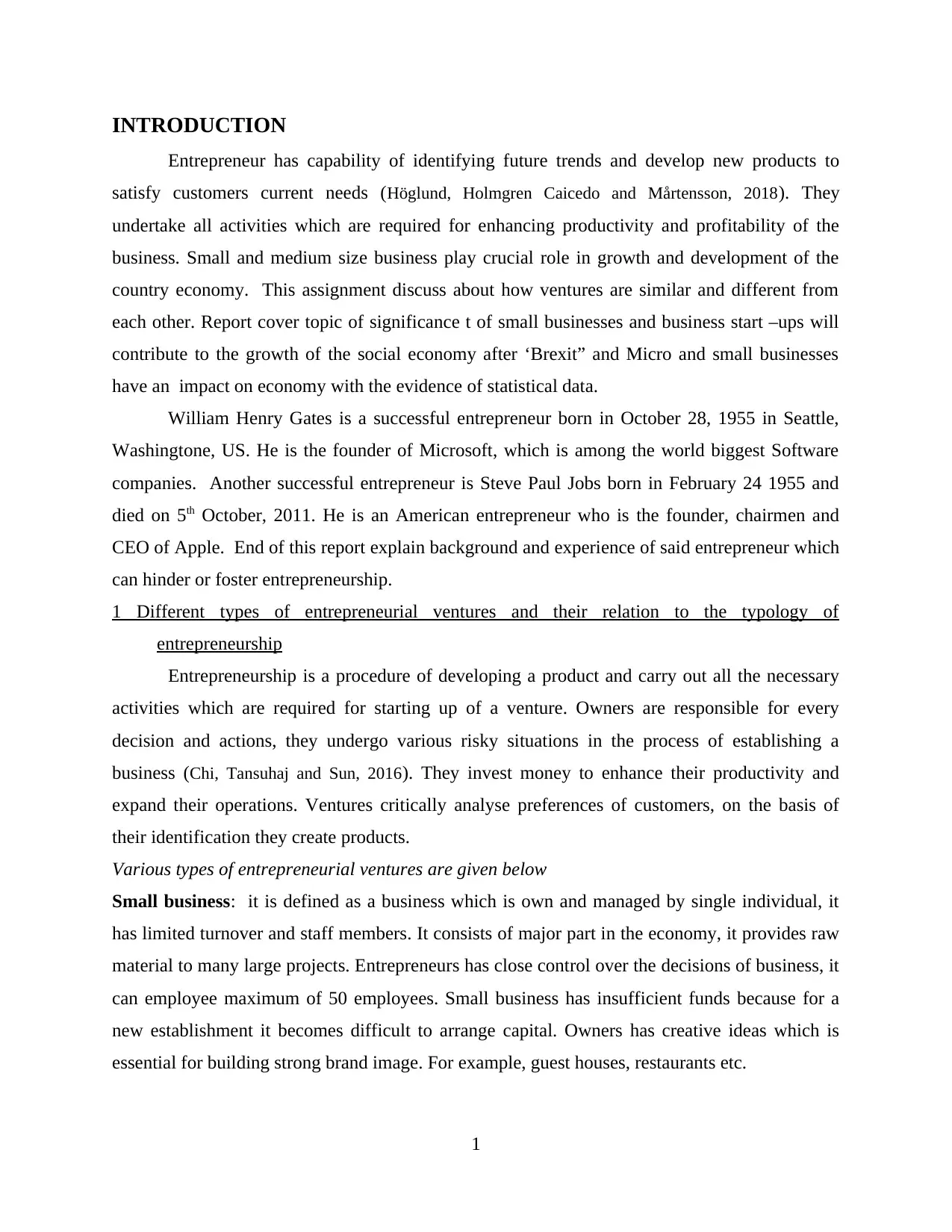
INTRODUCTION
Entrepreneur has capability of identifying future trends and develop new products to
satisfy customers current needs (Höglund, Holmgren Caicedo and Mårtensson, 2018). They
undertake all activities which are required for enhancing productivity and profitability of the
business. Small and medium size business play crucial role in growth and development of the
country economy. This assignment discuss about how ventures are similar and different from
each other. Report cover topic of significance t of small businesses and business start –ups will
contribute to the growth of the social economy after ‘Brexit” and Micro and small businesses
have an impact on economy with the evidence of statistical data.
William Henry Gates is a successful entrepreneur born in October 28, 1955 in Seattle,
Washingtone, US. He is the founder of Microsoft, which is among the world biggest Software
companies. Another successful entrepreneur is Steve Paul Jobs born in February 24 1955 and
died on 5th October, 2011. He is an American entrepreneur who is the founder, chairmen and
CEO of Apple. End of this report explain background and experience of said entrepreneur which
can hinder or foster entrepreneurship.
1 Different types of entrepreneurial ventures and their relation to the typology of
entrepreneurship
Entrepreneurship is a procedure of developing a product and carry out all the necessary
activities which are required for starting up of a venture. Owners are responsible for every
decision and actions, they undergo various risky situations in the process of establishing a
business (Chi, Tansuhaj and Sun, 2016). They invest money to enhance their productivity and
expand their operations. Ventures critically analyse preferences of customers, on the basis of
their identification they create products.
Various types of entrepreneurial ventures are given below
Small business: it is defined as a business which is own and managed by single individual, it
has limited turnover and staff members. It consists of major part in the economy, it provides raw
material to many large projects. Entrepreneurs has close control over the decisions of business, it
can employee maximum of 50 employees. Small business has insufficient funds because for a
new establishment it becomes difficult to arrange capital. Owners has creative ideas which is
essential for building strong brand image. For example, guest houses, restaurants etc.
1
Entrepreneur has capability of identifying future trends and develop new products to
satisfy customers current needs (Höglund, Holmgren Caicedo and Mårtensson, 2018). They
undertake all activities which are required for enhancing productivity and profitability of the
business. Small and medium size business play crucial role in growth and development of the
country economy. This assignment discuss about how ventures are similar and different from
each other. Report cover topic of significance t of small businesses and business start –ups will
contribute to the growth of the social economy after ‘Brexit” and Micro and small businesses
have an impact on economy with the evidence of statistical data.
William Henry Gates is a successful entrepreneur born in October 28, 1955 in Seattle,
Washingtone, US. He is the founder of Microsoft, which is among the world biggest Software
companies. Another successful entrepreneur is Steve Paul Jobs born in February 24 1955 and
died on 5th October, 2011. He is an American entrepreneur who is the founder, chairmen and
CEO of Apple. End of this report explain background and experience of said entrepreneur which
can hinder or foster entrepreneurship.
1 Different types of entrepreneurial ventures and their relation to the typology of
entrepreneurship
Entrepreneurship is a procedure of developing a product and carry out all the necessary
activities which are required for starting up of a venture. Owners are responsible for every
decision and actions, they undergo various risky situations in the process of establishing a
business (Chi, Tansuhaj and Sun, 2016). They invest money to enhance their productivity and
expand their operations. Ventures critically analyse preferences of customers, on the basis of
their identification they create products.
Various types of entrepreneurial ventures are given below
Small business: it is defined as a business which is own and managed by single individual, it
has limited turnover and staff members. It consists of major part in the economy, it provides raw
material to many large projects. Entrepreneurs has close control over the decisions of business, it
can employee maximum of 50 employees. Small business has insufficient funds because for a
new establishment it becomes difficult to arrange capital. Owners has creative ideas which is
essential for building strong brand image. For example, guest houses, restaurants etc.
1
⊘ This is a preview!⊘
Do you want full access?
Subscribe today to unlock all pages.

Trusted by 1+ million students worldwide
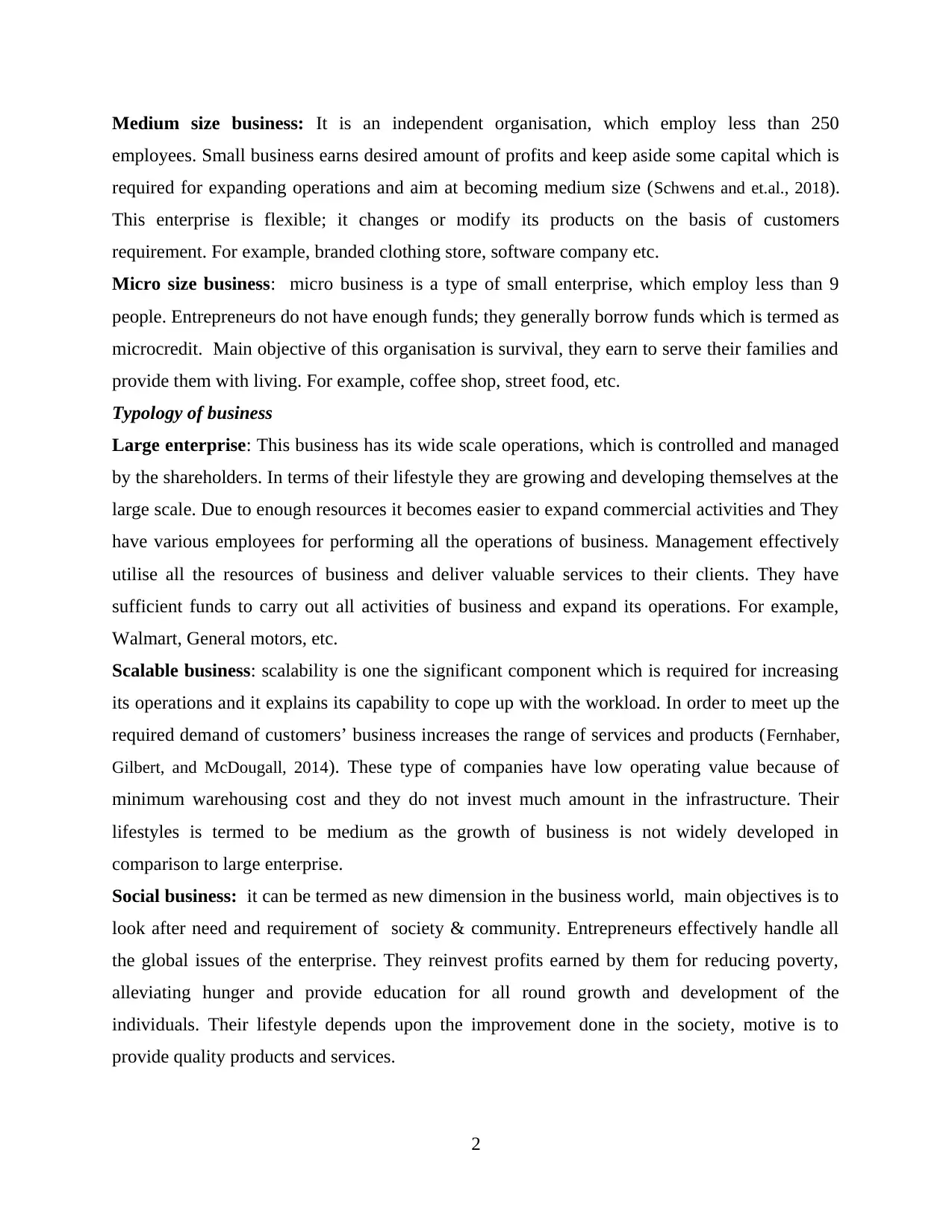
Medium size business: It is an independent organisation, which employ less than 250
employees. Small business earns desired amount of profits and keep aside some capital which is
required for expanding operations and aim at becoming medium size (Schwens and et.al., 2018).
This enterprise is flexible; it changes or modify its products on the basis of customers
requirement. For example, branded clothing store, software company etc.
Micro size business: micro business is a type of small enterprise, which employ less than 9
people. Entrepreneurs do not have enough funds; they generally borrow funds which is termed as
microcredit. Main objective of this organisation is survival, they earn to serve their families and
provide them with living. For example, coffee shop, street food, etc.
Typology of business
Large enterprise: This business has its wide scale operations, which is controlled and managed
by the shareholders. In terms of their lifestyle they are growing and developing themselves at the
large scale. Due to enough resources it becomes easier to expand commercial activities and They
have various employees for performing all the operations of business. Management effectively
utilise all the resources of business and deliver valuable services to their clients. They have
sufficient funds to carry out all activities of business and expand its operations. For example,
Walmart, General motors, etc.
Scalable business: scalability is one the significant component which is required for increasing
its operations and it explains its capability to cope up with the workload. In order to meet up the
required demand of customers’ business increases the range of services and products (Fernhaber,
Gilbert, and McDougall, 2014). These type of companies have low operating value because of
minimum warehousing cost and they do not invest much amount in the infrastructure. Their
lifestyles is termed to be medium as the growth of business is not widely developed in
comparison to large enterprise.
Social business: it can be termed as new dimension in the business world, main objectives is to
look after need and requirement of society & community. Entrepreneurs effectively handle all
the global issues of the enterprise. They reinvest profits earned by them for reducing poverty,
alleviating hunger and provide education for all round growth and development of the
individuals. Their lifestyle depends upon the improvement done in the society, motive is to
provide quality products and services.
2
employees. Small business earns desired amount of profits and keep aside some capital which is
required for expanding operations and aim at becoming medium size (Schwens and et.al., 2018).
This enterprise is flexible; it changes or modify its products on the basis of customers
requirement. For example, branded clothing store, software company etc.
Micro size business: micro business is a type of small enterprise, which employ less than 9
people. Entrepreneurs do not have enough funds; they generally borrow funds which is termed as
microcredit. Main objective of this organisation is survival, they earn to serve their families and
provide them with living. For example, coffee shop, street food, etc.
Typology of business
Large enterprise: This business has its wide scale operations, which is controlled and managed
by the shareholders. In terms of their lifestyle they are growing and developing themselves at the
large scale. Due to enough resources it becomes easier to expand commercial activities and They
have various employees for performing all the operations of business. Management effectively
utilise all the resources of business and deliver valuable services to their clients. They have
sufficient funds to carry out all activities of business and expand its operations. For example,
Walmart, General motors, etc.
Scalable business: scalability is one the significant component which is required for increasing
its operations and it explains its capability to cope up with the workload. In order to meet up the
required demand of customers’ business increases the range of services and products (Fernhaber,
Gilbert, and McDougall, 2014). These type of companies have low operating value because of
minimum warehousing cost and they do not invest much amount in the infrastructure. Their
lifestyles is termed to be medium as the growth of business is not widely developed in
comparison to large enterprise.
Social business: it can be termed as new dimension in the business world, main objectives is to
look after need and requirement of society & community. Entrepreneurs effectively handle all
the global issues of the enterprise. They reinvest profits earned by them for reducing poverty,
alleviating hunger and provide education for all round growth and development of the
individuals. Their lifestyle depends upon the improvement done in the society, motive is to
provide quality products and services.
2
Paraphrase This Document
Need a fresh take? Get an instant paraphrase of this document with our AI Paraphraser
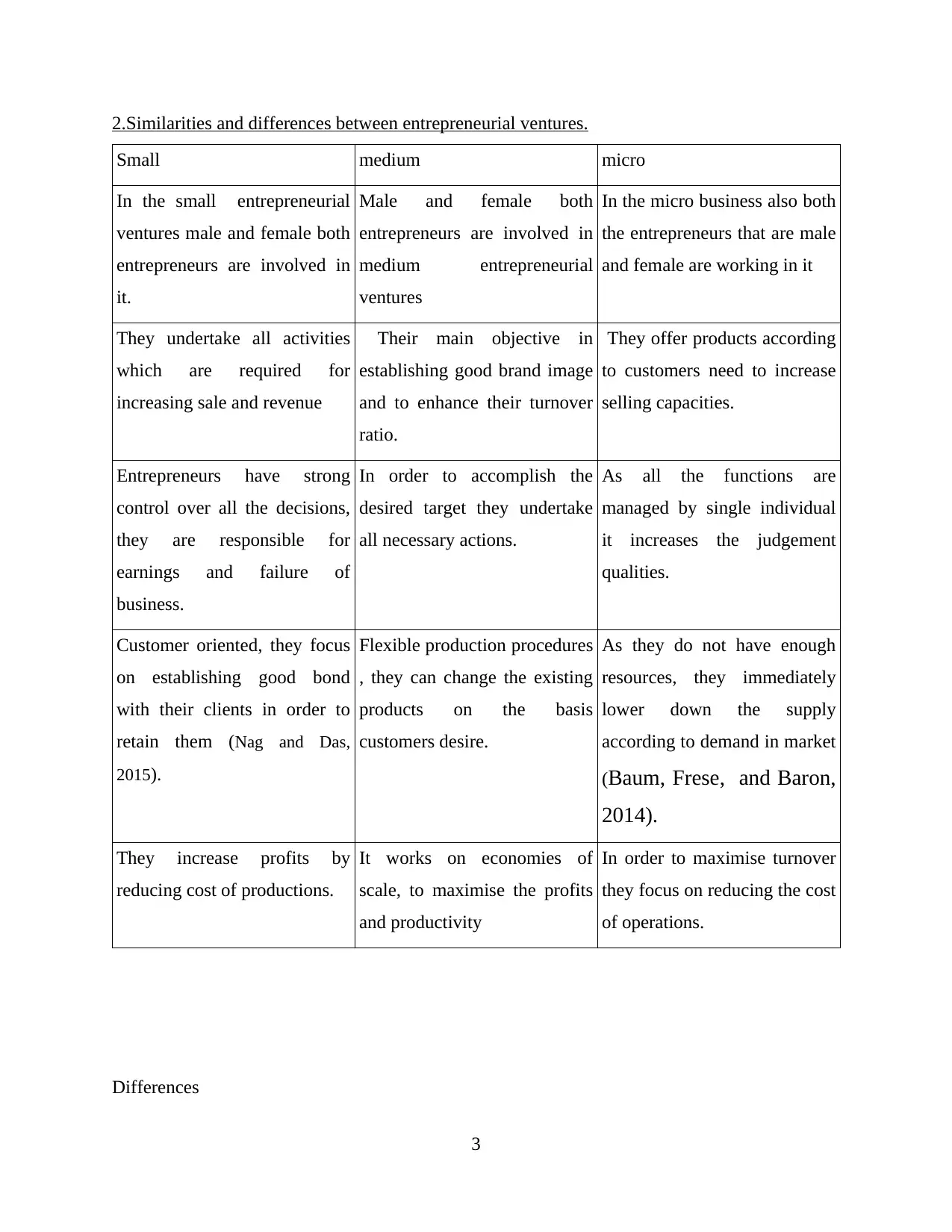
2.Similarities and differences between entrepreneurial ventures.
Small medium micro
In the small entrepreneurial
ventures male and female both
entrepreneurs are involved in
it.
Male and female both
entrepreneurs are involved in
medium entrepreneurial
ventures
In the micro business also both
the entrepreneurs that are male
and female are working in it
They undertake all activities
which are required for
increasing sale and revenue
Their main objective in
establishing good brand image
and to enhance their turnover
ratio.
They offer products according
to customers need to increase
selling capacities.
Entrepreneurs have strong
control over all the decisions,
they are responsible for
earnings and failure of
business.
In order to accomplish the
desired target they undertake
all necessary actions.
As all the functions are
managed by single individual
it increases the judgement
qualities.
Customer oriented, they focus
on establishing good bond
with their clients in order to
retain them (Nag and Das,
2015).
Flexible production procedures
, they can change the existing
products on the basis
customers desire.
As they do not have enough
resources, they immediately
lower down the supply
according to demand in market
(Baum, Frese, and Baron,
2014).
They increase profits by
reducing cost of productions.
It works on economies of
scale, to maximise the profits
and productivity
In order to maximise turnover
they focus on reducing the cost
of operations.
Differences
3
Small medium micro
In the small entrepreneurial
ventures male and female both
entrepreneurs are involved in
it.
Male and female both
entrepreneurs are involved in
medium entrepreneurial
ventures
In the micro business also both
the entrepreneurs that are male
and female are working in it
They undertake all activities
which are required for
increasing sale and revenue
Their main objective in
establishing good brand image
and to enhance their turnover
ratio.
They offer products according
to customers need to increase
selling capacities.
Entrepreneurs have strong
control over all the decisions,
they are responsible for
earnings and failure of
business.
In order to accomplish the
desired target they undertake
all necessary actions.
As all the functions are
managed by single individual
it increases the judgement
qualities.
Customer oriented, they focus
on establishing good bond
with their clients in order to
retain them (Nag and Das,
2015).
Flexible production procedures
, they can change the existing
products on the basis
customers desire.
As they do not have enough
resources, they immediately
lower down the supply
according to demand in market
(Baum, Frese, and Baron,
2014).
They increase profits by
reducing cost of productions.
It works on economies of
scale, to maximise the profits
and productivity
In order to maximise turnover
they focus on reducing the cost
of operations.
Differences
3
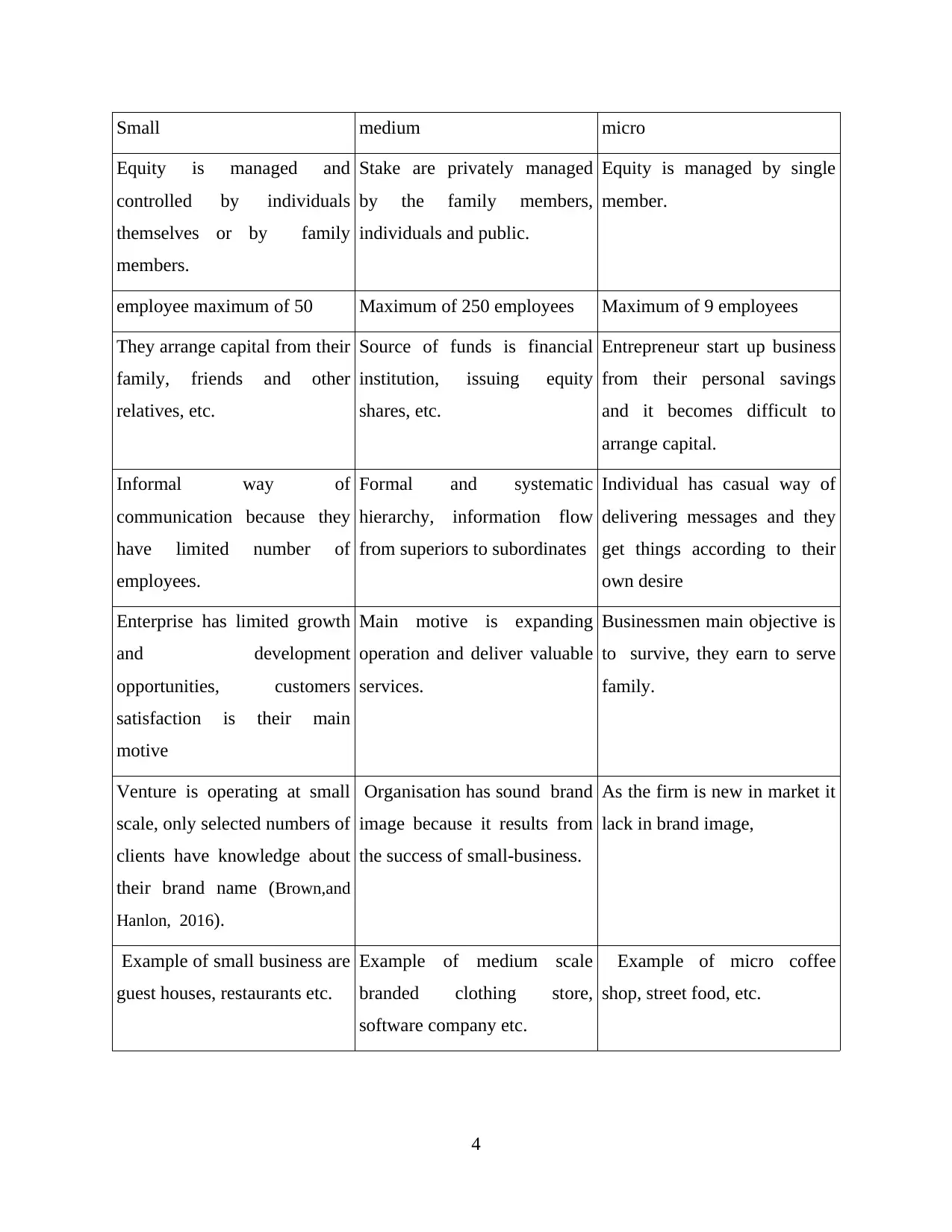
Small medium micro
Equity is managed and
controlled by individuals
themselves or by family
members.
Stake are privately managed
by the family members,
individuals and public.
Equity is managed by single
member.
employee maximum of 50 Maximum of 250 employees Maximum of 9 employees
They arrange capital from their
family, friends and other
relatives, etc.
Source of funds is financial
institution, issuing equity
shares, etc.
Entrepreneur start up business
from their personal savings
and it becomes difficult to
arrange capital.
Informal way of
communication because they
have limited number of
employees.
Formal and systematic
hierarchy, information flow
from superiors to subordinates
Individual has casual way of
delivering messages and they
get things according to their
own desire
Enterprise has limited growth
and development
opportunities, customers
satisfaction is their main
motive
Main motive is expanding
operation and deliver valuable
services.
Businessmen main objective is
to survive, they earn to serve
family.
Venture is operating at small
scale, only selected numbers of
clients have knowledge about
their brand name (Brown,and
Hanlon, 2016).
Organisation has sound brand
image because it results from
the success of small-business.
As the firm is new in market it
lack in brand image,
Example of small business are
guest houses, restaurants etc.
Example of medium scale
branded clothing store,
software company etc.
Example of micro coffee
shop, street food, etc.
4
Equity is managed and
controlled by individuals
themselves or by family
members.
Stake are privately managed
by the family members,
individuals and public.
Equity is managed by single
member.
employee maximum of 50 Maximum of 250 employees Maximum of 9 employees
They arrange capital from their
family, friends and other
relatives, etc.
Source of funds is financial
institution, issuing equity
shares, etc.
Entrepreneur start up business
from their personal savings
and it becomes difficult to
arrange capital.
Informal way of
communication because they
have limited number of
employees.
Formal and systematic
hierarchy, information flow
from superiors to subordinates
Individual has casual way of
delivering messages and they
get things according to their
own desire
Enterprise has limited growth
and development
opportunities, customers
satisfaction is their main
motive
Main motive is expanding
operation and deliver valuable
services.
Businessmen main objective is
to survive, they earn to serve
family.
Venture is operating at small
scale, only selected numbers of
clients have knowledge about
their brand name (Brown,and
Hanlon, 2016).
Organisation has sound brand
image because it results from
the success of small-business.
As the firm is new in market it
lack in brand image,
Example of small business are
guest houses, restaurants etc.
Example of medium scale
branded clothing store,
software company etc.
Example of micro coffee
shop, street food, etc.
4
⊘ This is a preview!⊘
Do you want full access?
Subscribe today to unlock all pages.

Trusted by 1+ million students worldwide
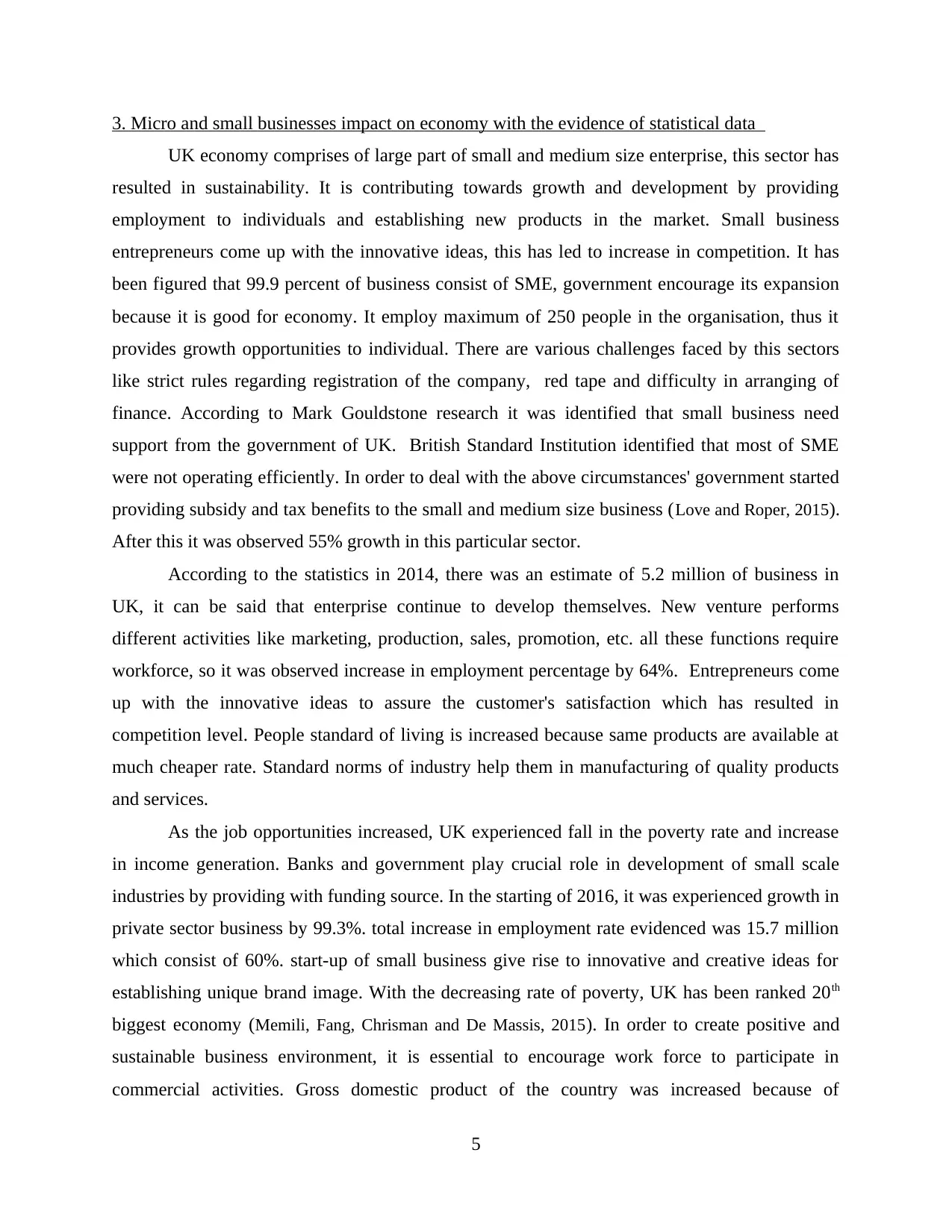
3. Micro and small businesses impact on economy with the evidence of statistical data
UK economy comprises of large part of small and medium size enterprise, this sector has
resulted in sustainability. It is contributing towards growth and development by providing
employment to individuals and establishing new products in the market. Small business
entrepreneurs come up with the innovative ideas, this has led to increase in competition. It has
been figured that 99.9 percent of business consist of SME, government encourage its expansion
because it is good for economy. It employ maximum of 250 people in the organisation, thus it
provides growth opportunities to individual. There are various challenges faced by this sectors
like strict rules regarding registration of the company, red tape and difficulty in arranging of
finance. According to Mark Gouldstone research it was identified that small business need
support from the government of UK. British Standard Institution identified that most of SME
were not operating efficiently. In order to deal with the above circumstances' government started
providing subsidy and tax benefits to the small and medium size business (Love and Roper, 2015).
After this it was observed 55% growth in this particular sector.
According to the statistics in 2014, there was an estimate of 5.2 million of business in
UK, it can be said that enterprise continue to develop themselves. New venture performs
different activities like marketing, production, sales, promotion, etc. all these functions require
workforce, so it was observed increase in employment percentage by 64%. Entrepreneurs come
up with the innovative ideas to assure the customer's satisfaction which has resulted in
competition level. People standard of living is increased because same products are available at
much cheaper rate. Standard norms of industry help them in manufacturing of quality products
and services.
As the job opportunities increased, UK experienced fall in the poverty rate and increase
in income generation. Banks and government play crucial role in development of small scale
industries by providing with funding source. In the starting of 2016, it was experienced growth in
private sector business by 99.3%. total increase in employment rate evidenced was 15.7 million
which consist of 60%. start-up of small business give rise to innovative and creative ideas for
establishing unique brand image. With the decreasing rate of poverty, UK has been ranked 20th
biggest economy (Memili, Fang, Chrisman and De Massis, 2015). In order to create positive and
sustainable business environment, it is essential to encourage work force to participate in
commercial activities. Gross domestic product of the country was increased because of
5
UK economy comprises of large part of small and medium size enterprise, this sector has
resulted in sustainability. It is contributing towards growth and development by providing
employment to individuals and establishing new products in the market. Small business
entrepreneurs come up with the innovative ideas, this has led to increase in competition. It has
been figured that 99.9 percent of business consist of SME, government encourage its expansion
because it is good for economy. It employ maximum of 250 people in the organisation, thus it
provides growth opportunities to individual. There are various challenges faced by this sectors
like strict rules regarding registration of the company, red tape and difficulty in arranging of
finance. According to Mark Gouldstone research it was identified that small business need
support from the government of UK. British Standard Institution identified that most of SME
were not operating efficiently. In order to deal with the above circumstances' government started
providing subsidy and tax benefits to the small and medium size business (Love and Roper, 2015).
After this it was observed 55% growth in this particular sector.
According to the statistics in 2014, there was an estimate of 5.2 million of business in
UK, it can be said that enterprise continue to develop themselves. New venture performs
different activities like marketing, production, sales, promotion, etc. all these functions require
workforce, so it was observed increase in employment percentage by 64%. Entrepreneurs come
up with the innovative ideas to assure the customer's satisfaction which has resulted in
competition level. People standard of living is increased because same products are available at
much cheaper rate. Standard norms of industry help them in manufacturing of quality products
and services.
As the job opportunities increased, UK experienced fall in the poverty rate and increase
in income generation. Banks and government play crucial role in development of small scale
industries by providing with funding source. In the starting of 2016, it was experienced growth in
private sector business by 99.3%. total increase in employment rate evidenced was 15.7 million
which consist of 60%. start-up of small business give rise to innovative and creative ideas for
establishing unique brand image. With the decreasing rate of poverty, UK has been ranked 20th
biggest economy (Memili, Fang, Chrisman and De Massis, 2015). In order to create positive and
sustainable business environment, it is essential to encourage work force to participate in
commercial activities. Gross domestic product of the country was increased because of
5
Paraphrase This Document
Need a fresh take? Get an instant paraphrase of this document with our AI Paraphraser
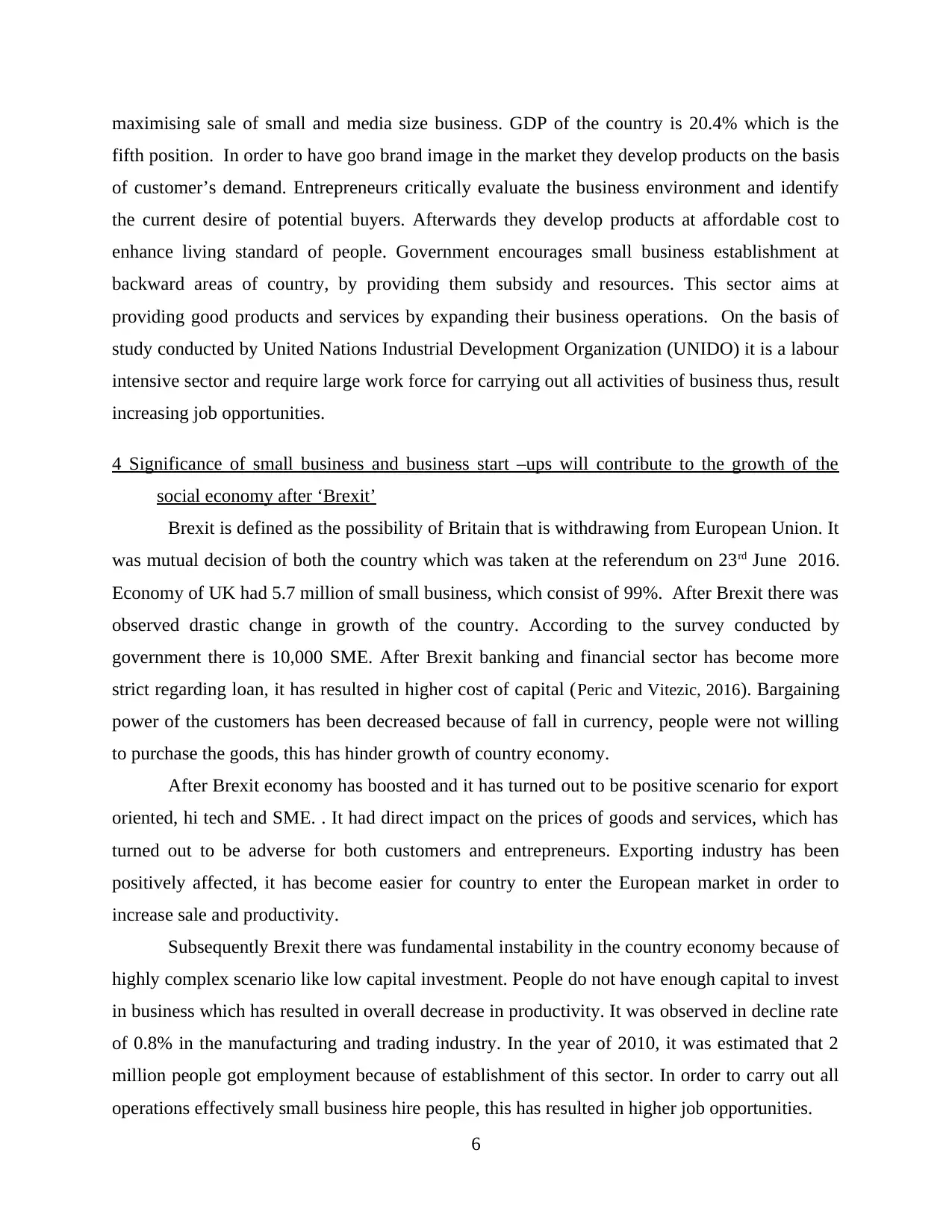
maximising sale of small and media size business. GDP of the country is 20.4% which is the
fifth position. In order to have goo brand image in the market they develop products on the basis
of customer’s demand. Entrepreneurs critically evaluate the business environment and identify
the current desire of potential buyers. Afterwards they develop products at affordable cost to
enhance living standard of people. Government encourages small business establishment at
backward areas of country, by providing them subsidy and resources. This sector aims at
providing good products and services by expanding their business operations. On the basis of
study conducted by United Nations Industrial Development Organization (UNIDO) it is a labour
intensive sector and require large work force for carrying out all activities of business thus, result
increasing job opportunities.
4 Significance of small business and business start –ups will contribute to the growth of the
social economy after ‘Brexit’
Brexit is defined as the possibility of Britain that is withdrawing from European Union. It
was mutual decision of both the country which was taken at the referendum on 23rd June 2016.
Economy of UK had 5.7 million of small business, which consist of 99%. After Brexit there was
observed drastic change in growth of the country. According to the survey conducted by
government there is 10,000 SME. After Brexit banking and financial sector has become more
strict regarding loan, it has resulted in higher cost of capital (Peric and Vitezic, 2016). Bargaining
power of the customers has been decreased because of fall in currency, people were not willing
to purchase the goods, this has hinder growth of country economy.
After Brexit economy has boosted and it has turned out to be positive scenario for export
oriented, hi tech and SME. . It had direct impact on the prices of goods and services, which has
turned out to be adverse for both customers and entrepreneurs. Exporting industry has been
positively affected, it has become easier for country to enter the European market in order to
increase sale and productivity.
Subsequently Brexit there was fundamental instability in the country economy because of
highly complex scenario like low capital investment. People do not have enough capital to invest
in business which has resulted in overall decrease in productivity. It was observed in decline rate
of 0.8% in the manufacturing and trading industry. In the year of 2010, it was estimated that 2
million people got employment because of establishment of this sector. In order to carry out all
operations effectively small business hire people, this has resulted in higher job opportunities.
6
fifth position. In order to have goo brand image in the market they develop products on the basis
of customer’s demand. Entrepreneurs critically evaluate the business environment and identify
the current desire of potential buyers. Afterwards they develop products at affordable cost to
enhance living standard of people. Government encourages small business establishment at
backward areas of country, by providing them subsidy and resources. This sector aims at
providing good products and services by expanding their business operations. On the basis of
study conducted by United Nations Industrial Development Organization (UNIDO) it is a labour
intensive sector and require large work force for carrying out all activities of business thus, result
increasing job opportunities.
4 Significance of small business and business start –ups will contribute to the growth of the
social economy after ‘Brexit’
Brexit is defined as the possibility of Britain that is withdrawing from European Union. It
was mutual decision of both the country which was taken at the referendum on 23rd June 2016.
Economy of UK had 5.7 million of small business, which consist of 99%. After Brexit there was
observed drastic change in growth of the country. According to the survey conducted by
government there is 10,000 SME. After Brexit banking and financial sector has become more
strict regarding loan, it has resulted in higher cost of capital (Peric and Vitezic, 2016). Bargaining
power of the customers has been decreased because of fall in currency, people were not willing
to purchase the goods, this has hinder growth of country economy.
After Brexit economy has boosted and it has turned out to be positive scenario for export
oriented, hi tech and SME. . It had direct impact on the prices of goods and services, which has
turned out to be adverse for both customers and entrepreneurs. Exporting industry has been
positively affected, it has become easier for country to enter the European market in order to
increase sale and productivity.
Subsequently Brexit there was fundamental instability in the country economy because of
highly complex scenario like low capital investment. People do not have enough capital to invest
in business which has resulted in overall decrease in productivity. It was observed in decline rate
of 0.8% in the manufacturing and trading industry. In the year of 2010, it was estimated that 2
million people got employment because of establishment of this sector. In order to carry out all
operations effectively small business hire people, this has resulted in higher job opportunities.
6
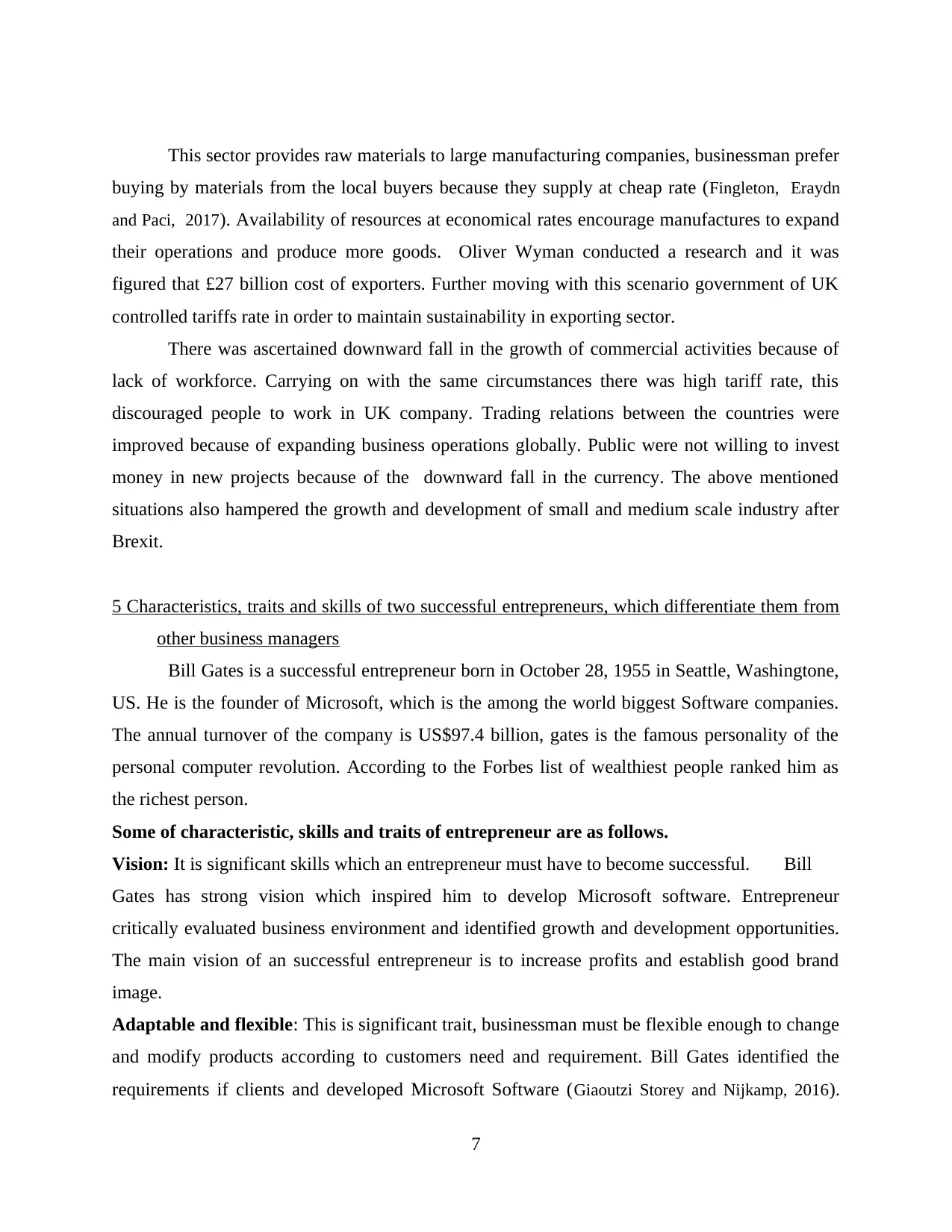
This sector provides raw materials to large manufacturing companies, businessman prefer
buying by materials from the local buyers because they supply at cheap rate (Fingleton, Eraydn
and Paci, 2017). Availability of resources at economical rates encourage manufactures to expand
their operations and produce more goods. Oliver Wyman conducted a research and it was
figured that £27 billion cost of exporters. Further moving with this scenario government of UK
controlled tariffs rate in order to maintain sustainability in exporting sector.
There was ascertained downward fall in the growth of commercial activities because of
lack of workforce. Carrying on with the same circumstances there was high tariff rate, this
discouraged people to work in UK company. Trading relations between the countries were
improved because of expanding business operations globally. Public were not willing to invest
money in new projects because of the downward fall in the currency. The above mentioned
situations also hampered the growth and development of small and medium scale industry after
Brexit.
5 Characteristics, traits and skills of two successful entrepreneurs, which differentiate them from
other business managers
Bill Gates is a successful entrepreneur born in October 28, 1955 in Seattle, Washingtone,
US. He is the founder of Microsoft, which is the among the world biggest Software companies.
The annual turnover of the company is US$97.4 billion, gates is the famous personality of the
personal computer revolution. According to the Forbes list of wealthiest people ranked him as
the richest person.
Some of characteristic, skills and traits of entrepreneur are as follows.
Vision: It is significant skills which an entrepreneur must have to become successful. Bill
Gates has strong vision which inspired him to develop Microsoft software. Entrepreneur
critically evaluated business environment and identified growth and development opportunities.
The main vision of an successful entrepreneur is to increase profits and establish good brand
image.
Adaptable and flexible: This is significant trait, businessman must be flexible enough to change
and modify products according to customers need and requirement. Bill Gates identified the
requirements if clients and developed Microsoft Software (Giaoutzi Storey and Nijkamp, 2016).
7
buying by materials from the local buyers because they supply at cheap rate (Fingleton, Eraydn
and Paci, 2017). Availability of resources at economical rates encourage manufactures to expand
their operations and produce more goods. Oliver Wyman conducted a research and it was
figured that £27 billion cost of exporters. Further moving with this scenario government of UK
controlled tariffs rate in order to maintain sustainability in exporting sector.
There was ascertained downward fall in the growth of commercial activities because of
lack of workforce. Carrying on with the same circumstances there was high tariff rate, this
discouraged people to work in UK company. Trading relations between the countries were
improved because of expanding business operations globally. Public were not willing to invest
money in new projects because of the downward fall in the currency. The above mentioned
situations also hampered the growth and development of small and medium scale industry after
Brexit.
5 Characteristics, traits and skills of two successful entrepreneurs, which differentiate them from
other business managers
Bill Gates is a successful entrepreneur born in October 28, 1955 in Seattle, Washingtone,
US. He is the founder of Microsoft, which is the among the world biggest Software companies.
The annual turnover of the company is US$97.4 billion, gates is the famous personality of the
personal computer revolution. According to the Forbes list of wealthiest people ranked him as
the richest person.
Some of characteristic, skills and traits of entrepreneur are as follows.
Vision: It is significant skills which an entrepreneur must have to become successful. Bill
Gates has strong vision which inspired him to develop Microsoft software. Entrepreneur
critically evaluated business environment and identified growth and development opportunities.
The main vision of an successful entrepreneur is to increase profits and establish good brand
image.
Adaptable and flexible: This is significant trait, businessman must be flexible enough to change
and modify products according to customers need and requirement. Bill Gates identified the
requirements if clients and developed Microsoft Software (Giaoutzi Storey and Nijkamp, 2016).
7
⊘ This is a preview!⊘
Do you want full access?
Subscribe today to unlock all pages.

Trusted by 1+ million students worldwide
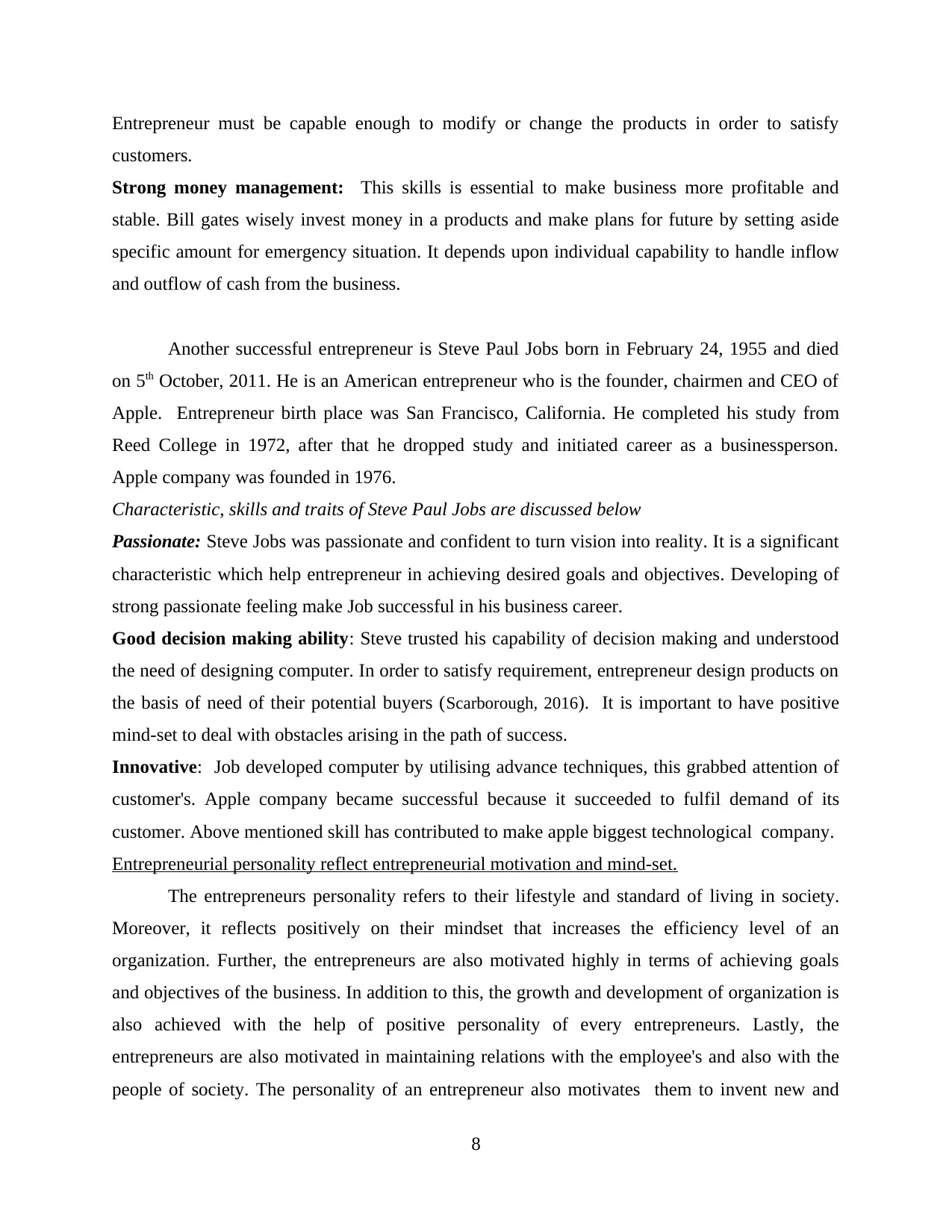
Entrepreneur must be capable enough to modify or change the products in order to satisfy
customers.
Strong money management: This skills is essential to make business more profitable and
stable. Bill gates wisely invest money in a products and make plans for future by setting aside
specific amount for emergency situation. It depends upon individual capability to handle inflow
and outflow of cash from the business.
Another successful entrepreneur is Steve Paul Jobs born in February 24, 1955 and died
on 5th October, 2011. He is an American entrepreneur who is the founder, chairmen and CEO of
Apple. Entrepreneur birth place was San Francisco, California. He completed his study from
Reed College in 1972, after that he dropped study and initiated career as a businessperson.
Apple company was founded in 1976.
Characteristic, skills and traits of Steve Paul Jobs are discussed below
Passionate: Steve Jobs was passionate and confident to turn vision into reality. It is a significant
characteristic which help entrepreneur in achieving desired goals and objectives. Developing of
strong passionate feeling make Job successful in his business career.
Good decision making ability: Steve trusted his capability of decision making and understood
the need of designing computer. In order to satisfy requirement, entrepreneur design products on
the basis of need of their potential buyers (Scarborough, 2016). It is important to have positive
mind-set to deal with obstacles arising in the path of success.
Innovative: Job developed computer by utilising advance techniques, this grabbed attention of
customer's. Apple company became successful because it succeeded to fulfil demand of its
customer. Above mentioned skill has contributed to make apple biggest technological company.
Entrepreneurial personality reflect entrepreneurial motivation and mind-set.
The entrepreneurs personality refers to their lifestyle and standard of living in society.
Moreover, it reflects positively on their mindset that increases the efficiency level of an
organization. Further, the entrepreneurs are also motivated highly in terms of achieving goals
and objectives of the business. In addition to this, the growth and development of organization is
also achieved with the help of positive personality of every entrepreneurs. Lastly, the
entrepreneurs are also motivated in maintaining relations with the employee's and also with the
people of society. The personality of an entrepreneur also motivates them to invent new and
8
customers.
Strong money management: This skills is essential to make business more profitable and
stable. Bill gates wisely invest money in a products and make plans for future by setting aside
specific amount for emergency situation. It depends upon individual capability to handle inflow
and outflow of cash from the business.
Another successful entrepreneur is Steve Paul Jobs born in February 24, 1955 and died
on 5th October, 2011. He is an American entrepreneur who is the founder, chairmen and CEO of
Apple. Entrepreneur birth place was San Francisco, California. He completed his study from
Reed College in 1972, after that he dropped study and initiated career as a businessperson.
Apple company was founded in 1976.
Characteristic, skills and traits of Steve Paul Jobs are discussed below
Passionate: Steve Jobs was passionate and confident to turn vision into reality. It is a significant
characteristic which help entrepreneur in achieving desired goals and objectives. Developing of
strong passionate feeling make Job successful in his business career.
Good decision making ability: Steve trusted his capability of decision making and understood
the need of designing computer. In order to satisfy requirement, entrepreneur design products on
the basis of need of their potential buyers (Scarborough, 2016). It is important to have positive
mind-set to deal with obstacles arising in the path of success.
Innovative: Job developed computer by utilising advance techniques, this grabbed attention of
customer's. Apple company became successful because it succeeded to fulfil demand of its
customer. Above mentioned skill has contributed to make apple biggest technological company.
Entrepreneurial personality reflect entrepreneurial motivation and mind-set.
The entrepreneurs personality refers to their lifestyle and standard of living in society.
Moreover, it reflects positively on their mindset that increases the efficiency level of an
organization. Further, the entrepreneurs are also motivated highly in terms of achieving goals
and objectives of the business. In addition to this, the growth and development of organization is
also achieved with the help of positive personality of every entrepreneurs. Lastly, the
entrepreneurs are also motivated in maintaining relations with the employee's and also with the
people of society. The personality of an entrepreneur also motivates them to invent new and
8
Paraphrase This Document
Need a fresh take? Get an instant paraphrase of this document with our AI Paraphraser
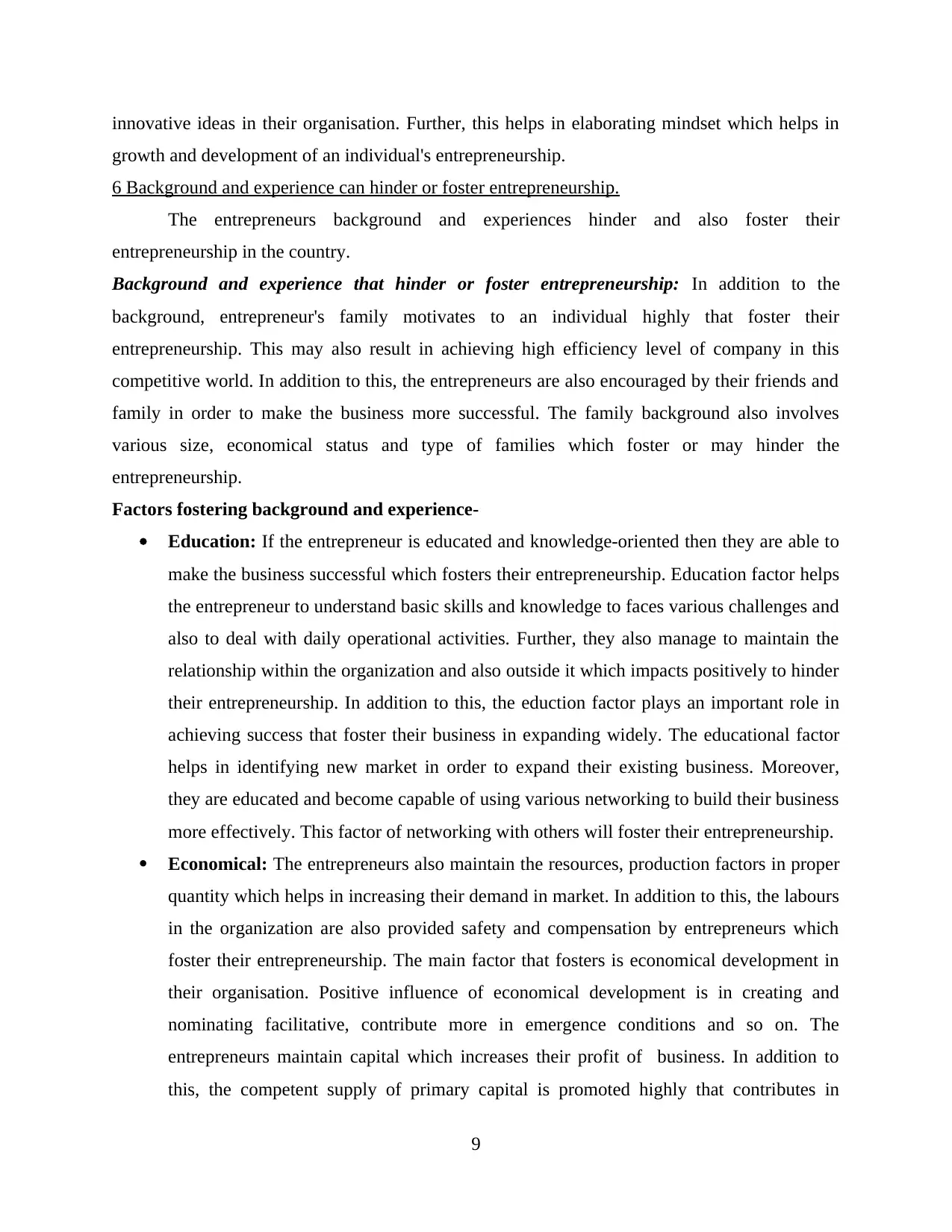
innovative ideas in their organisation. Further, this helps in elaborating mindset which helps in
growth and development of an individual's entrepreneurship.
6 Background and experience can hinder or foster entrepreneurship.
The entrepreneurs background and experiences hinder and also foster their
entrepreneurship in the country.
Background and experience that hinder or foster entrepreneurship: In addition to the
background, entrepreneur's family motivates to an individual highly that foster their
entrepreneurship. This may also result in achieving high efficiency level of company in this
competitive world. In addition to this, the entrepreneurs are also encouraged by their friends and
family in order to make the business more successful. The family background also involves
various size, economical status and type of families which foster or may hinder the
entrepreneurship.
Factors fostering background and experience-
Education: If the entrepreneur is educated and knowledge-oriented then they are able to
make the business successful which fosters their entrepreneurship. Education factor helps
the entrepreneur to understand basic skills and knowledge to faces various challenges and
also to deal with daily operational activities. Further, they also manage to maintain the
relationship within the organization and also outside it which impacts positively to hinder
their entrepreneurship. In addition to this, the eduction factor plays an important role in
achieving success that foster their business in expanding widely. The educational factor
helps in identifying new market in order to expand their existing business. Moreover,
they are educated and become capable of using various networking to build their business
more effectively. This factor of networking with others will foster their entrepreneurship.
Economical: The entrepreneurs also maintain the resources, production factors in proper
quantity which helps in increasing their demand in market. In addition to this, the labours
in the organization are also provided safety and compensation by entrepreneurs which
foster their entrepreneurship. The main factor that fosters is economical development in
their organisation. Positive influence of economical development is in creating and
nominating facilitative, contribute more in emergence conditions and so on. The
entrepreneurs maintain capital which increases their profit of business. In addition to
this, the competent supply of primary capital is promoted highly that contributes in
9
growth and development of an individual's entrepreneurship.
6 Background and experience can hinder or foster entrepreneurship.
The entrepreneurs background and experiences hinder and also foster their
entrepreneurship in the country.
Background and experience that hinder or foster entrepreneurship: In addition to the
background, entrepreneur's family motivates to an individual highly that foster their
entrepreneurship. This may also result in achieving high efficiency level of company in this
competitive world. In addition to this, the entrepreneurs are also encouraged by their friends and
family in order to make the business more successful. The family background also involves
various size, economical status and type of families which foster or may hinder the
entrepreneurship.
Factors fostering background and experience-
Education: If the entrepreneur is educated and knowledge-oriented then they are able to
make the business successful which fosters their entrepreneurship. Education factor helps
the entrepreneur to understand basic skills and knowledge to faces various challenges and
also to deal with daily operational activities. Further, they also manage to maintain the
relationship within the organization and also outside it which impacts positively to hinder
their entrepreneurship. In addition to this, the eduction factor plays an important role in
achieving success that foster their business in expanding widely. The educational factor
helps in identifying new market in order to expand their existing business. Moreover,
they are educated and become capable of using various networking to build their business
more effectively. This factor of networking with others will foster their entrepreneurship.
Economical: The entrepreneurs also maintain the resources, production factors in proper
quantity which helps in increasing their demand in market. In addition to this, the labours
in the organization are also provided safety and compensation by entrepreneurs which
foster their entrepreneurship. The main factor that fosters is economical development in
their organisation. Positive influence of economical development is in creating and
nominating facilitative, contribute more in emergence conditions and so on. The
entrepreneurs maintain capital which increases their profit of business. In addition to
this, the competent supply of primary capital is promoted highly that contributes in
9
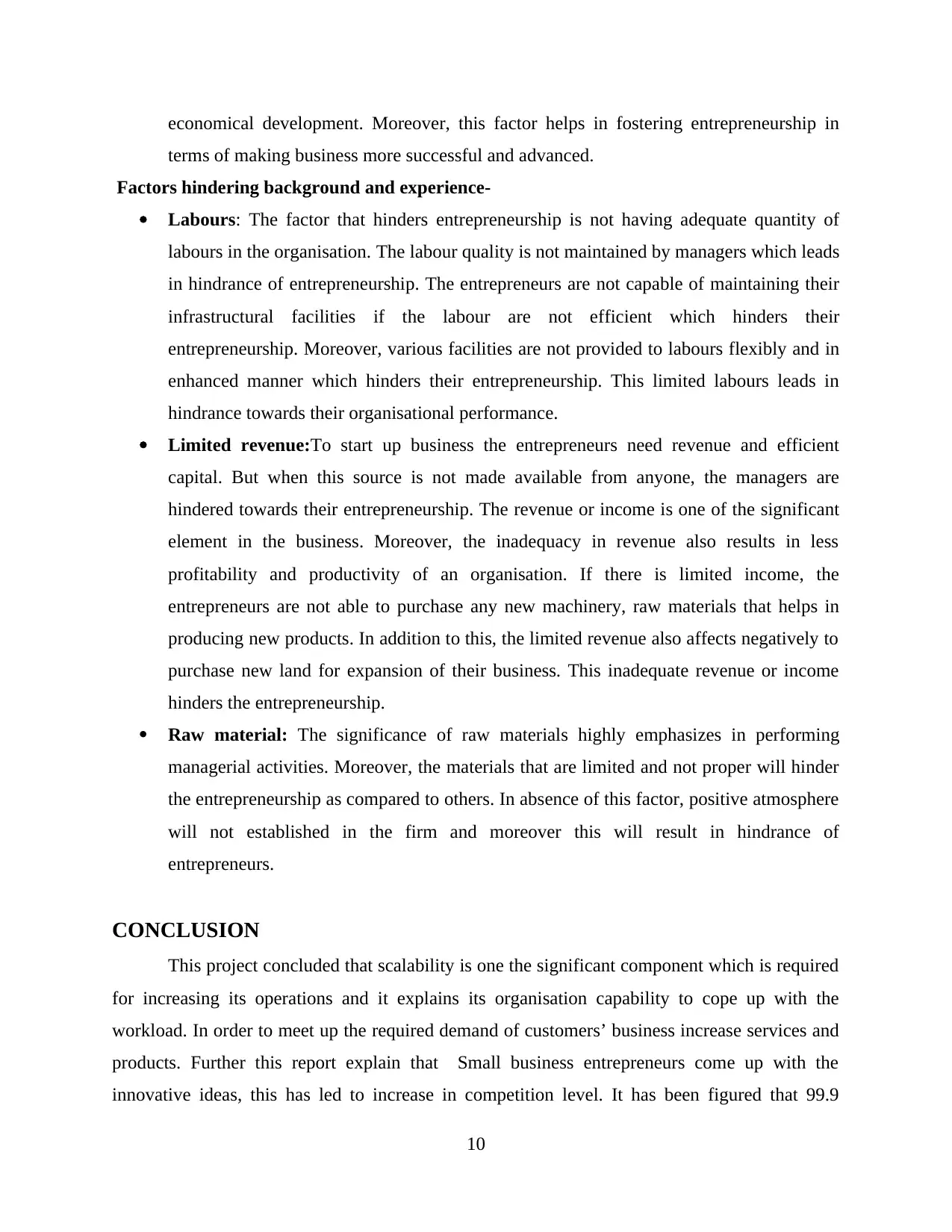
economical development. Moreover, this factor helps in fostering entrepreneurship in
terms of making business more successful and advanced.
Factors hindering background and experience-
Labours: The factor that hinders entrepreneurship is not having adequate quantity of
labours in the organisation. The labour quality is not maintained by managers which leads
in hindrance of entrepreneurship. The entrepreneurs are not capable of maintaining their
infrastructural facilities if the labour are not efficient which hinders their
entrepreneurship. Moreover, various facilities are not provided to labours flexibly and in
enhanced manner which hinders their entrepreneurship. This limited labours leads in
hindrance towards their organisational performance.
Limited revenue:To start up business the entrepreneurs need revenue and efficient
capital. But when this source is not made available from anyone, the managers are
hindered towards their entrepreneurship. The revenue or income is one of the significant
element in the business. Moreover, the inadequacy in revenue also results in less
profitability and productivity of an organisation. If there is limited income, the
entrepreneurs are not able to purchase any new machinery, raw materials that helps in
producing new products. In addition to this, the limited revenue also affects negatively to
purchase new land for expansion of their business. This inadequate revenue or income
hinders the entrepreneurship.
Raw material: The significance of raw materials highly emphasizes in performing
managerial activities. Moreover, the materials that are limited and not proper will hinder
the entrepreneurship as compared to others. In absence of this factor, positive atmosphere
will not established in the firm and moreover this will result in hindrance of
entrepreneurs.
CONCLUSION
This project concluded that scalability is one the significant component which is required
for increasing its operations and it explains its organisation capability to cope up with the
workload. In order to meet up the required demand of customers’ business increase services and
products. Further this report explain that Small business entrepreneurs come up with the
innovative ideas, this has led to increase in competition level. It has been figured that 99.9
10
terms of making business more successful and advanced.
Factors hindering background and experience-
Labours: The factor that hinders entrepreneurship is not having adequate quantity of
labours in the organisation. The labour quality is not maintained by managers which leads
in hindrance of entrepreneurship. The entrepreneurs are not capable of maintaining their
infrastructural facilities if the labour are not efficient which hinders their
entrepreneurship. Moreover, various facilities are not provided to labours flexibly and in
enhanced manner which hinders their entrepreneurship. This limited labours leads in
hindrance towards their organisational performance.
Limited revenue:To start up business the entrepreneurs need revenue and efficient
capital. But when this source is not made available from anyone, the managers are
hindered towards their entrepreneurship. The revenue or income is one of the significant
element in the business. Moreover, the inadequacy in revenue also results in less
profitability and productivity of an organisation. If there is limited income, the
entrepreneurs are not able to purchase any new machinery, raw materials that helps in
producing new products. In addition to this, the limited revenue also affects negatively to
purchase new land for expansion of their business. This inadequate revenue or income
hinders the entrepreneurship.
Raw material: The significance of raw materials highly emphasizes in performing
managerial activities. Moreover, the materials that are limited and not proper will hinder
the entrepreneurship as compared to others. In absence of this factor, positive atmosphere
will not established in the firm and moreover this will result in hindrance of
entrepreneurs.
CONCLUSION
This project concluded that scalability is one the significant component which is required
for increasing its operations and it explains its organisation capability to cope up with the
workload. In order to meet up the required demand of customers’ business increase services and
products. Further this report explain that Small business entrepreneurs come up with the
innovative ideas, this has led to increase in competition level. It has been figured that 99.9
10
⊘ This is a preview!⊘
Do you want full access?
Subscribe today to unlock all pages.

Trusted by 1+ million students worldwide
1 out of 15
Related Documents
Your All-in-One AI-Powered Toolkit for Academic Success.
+13062052269
info@desklib.com
Available 24*7 on WhatsApp / Email
![[object Object]](/_next/static/media/star-bottom.7253800d.svg)
Unlock your academic potential
Copyright © 2020–2026 A2Z Services. All Rights Reserved. Developed and managed by ZUCOL.





